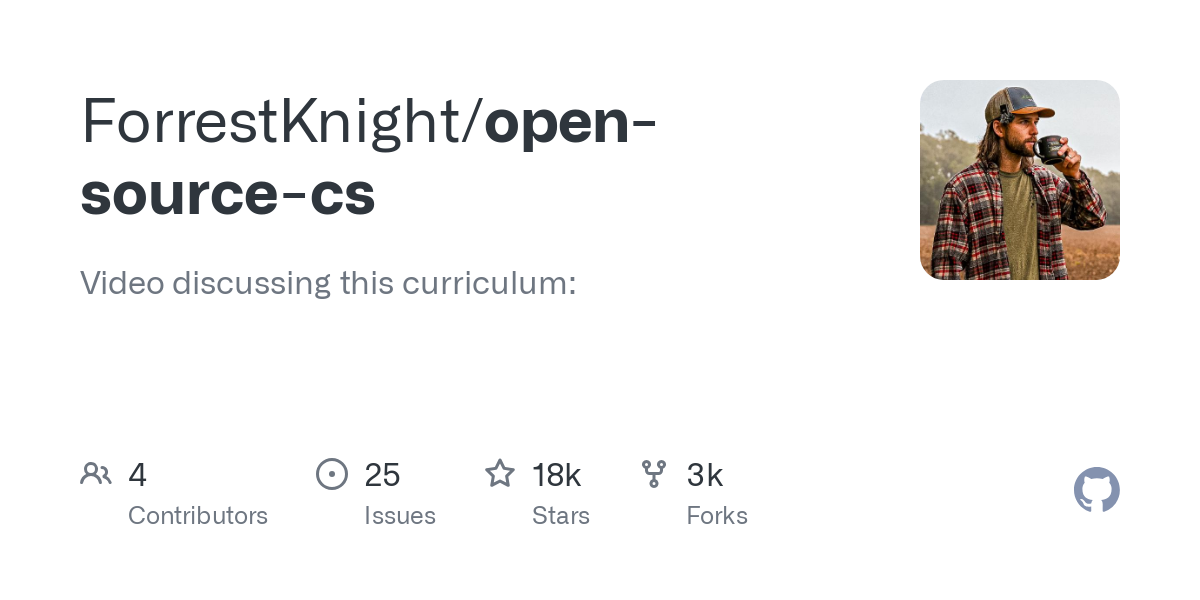- cross-posted to:
- linux@lemmy.ml
- cross-posted to:
- linux@lemmy.ml
“College is needed” comments are so weird in a field that can be done on an island with a solar battery. CS isn’t medicine or engineering, and the field is so young that requiring a “formal education” most likely will have negative effects of teaching poor practices that are not up to date
I think those are all Europeans rubbing their free or free to us colleges in our face :(
Individual financial cost has nothing to do with my comment
I sense that as you learn more about CS, it could change your opinion about coursework
Many courses are free and books can be purchased outside of university
I want to add that getting a degree likely will create a social network and provide experience of working in a team. These days that may be replaced by contributing to open source and going to free conferences (although these seem rare 😢).
So even though I am pro getting at least one first year of CS degree (because it’s the most useful one because teaches to think rather than specifics), I agree that it can be fully replaced by a well though out self-education, and from purely CS standpoint self-education might even be of a better quality.
But yeah, I must disclose that I am a European rubbing free education, and I studied in university not college. So my opinion may be influenced by that and I don’t know if first year in college would’ve been as useful as it was in university.
100%. I think most university degrees are for the social aspect, which is not to be ignored
I’m going to toot my own horn here, because I hate these lists, because it does not show you a clear order in which to learn things.
https://thaumatorium.com/articles/mit-courses/mit.drawio.svg
This svg is a dependency graph of most, if not all, Programming/Math related courses from MIT, which means the leftmost courses are dependencies for those to the right. The lines are the dependencies. They are color coded for your convenience.
I made this because I tried to follow a course I was missing dependencies for, where I found out most courses have dependencies and this provides a nice overview of what you’d need to learn to get to the point you want to reach.
Whi getting through college, I was always bummed that we have to learn a lot of stuff that seemed super irelevant to my future carreer, while also being annoying. Stuff like prolog, Phyro, Lisp, Assembly, or bunch of obscure math.
It was only years later when I finally realized why it was important - the school wasn’t for teaching me to be the C#/Java programmer, but it taught me to be A programmer. I can pick up and start successfully writing anything I need, in any language, relatively quickly and without issues, nonmatter whether it’s functional, objective, or wharever style of language, because I’ve very probably already had to deal with, learn, understand and pass exams in language that is similar to it, since college made me learn a language from almost every style or flavor of languages there are.
I was surprised when I first saw colleagues struggle with picking up languages other than the ones they work in, and that was when I finally realized why and how sneakily did the college make me a universal programmer without me noticing it. And that’s something that’s harder to get when self-taught, because you don’t get exams and it’s easier to miss the point and just skip courses on lisp, prolog or lambda calculus, because it seems irrelevant, but the different point of view and approach used when writing in those languahes is what will teach you the most.
Yup, people often mistake being a software developer for learning a language or a platform. Nope knowing and understanding the underlying systems and ideas / structures you will be working with is often far more important. The code pretty much stays the same. They syntax and features just differ a little
I never did a CS degree but recently I’ve been doing some things that make me wish I had. But it isn’t any of this stuff which seems mostly programming things that you can easily learn outside academia.
The stuff I would like to understand which I haven’t yet been able to learn on my own is the hard computer sciency stuff: lambda calculus, type inference (how do you read that weird judgement syntax?), how SAT/SMT solvers work, dependent typing systems… Does anyone have any good resources for those sorts of things?
Removed by mod
I am piggybacking a comment that I can’t find anymore, but let me state again their concerns:
- No logic? No automata theory? Language processors?
- What about math that isn’t usually part of every course in engineering but is in CS, like discrete math?
It’s all over the place.
Nothing about networking?
deleted by creator
Interesting, but means little without accreditation.
EDIT: Also, why’s it all Java?
EDIT2: Addressing the downvotes: If you really think that any employer these days is going to be happy with “Learned from a list on Github” on your resume then you’re sorely mistaken. It doesn’t matter if the courses match an accredited program. The accreditation is what matters because no accreditation = no diploma. Employers like diplomas.
Some people still think it’s 2002
The ReadMe states these are all courses taught at reputable universities. Do you know of any courses taught at these universities that utilizes Rust or C/C++? Not asking to criticize or anything, I’m legitimately curious because I too would like to see more focus on these languages over Java.
Idk about American universities, but C++ was taught at Memorial University of Newfoundland when I attended 8 years ago. Granted it was a robotics class so maybe it’s different. Either way, makes more sense to me to learn C/C++ since most things are programmed in that.
I second @hellofriend, I learnt C++ as practical courses in the University.
I could somewhat understand teaching Java as professional education (although it creates positive feedback loop that doesn’t do much good), but not exclusively teaching Java as part of CS degree.
Removed by mod
And an advice to others, go [back] to college. It’s the only way to get a job these days. The days of “self-taught wiz-kid” are over.
Wut lol, definitely not. At least in tech/programming careers and it has been starting to spread to other industries (slowly, but spreading none the less). A solid project portfolio, well written resume and maybe a few applicable well chosen certifications can get you far.
I’m decently high up with the ability to hire and fire and I can tell you I def choose the self-taught person with a solid portfolio full of cool personal projects and self taught over someone just fresh out of college with the college-standard portfolio just about every time
Would love to know what kind of cool personal projects you’ve seen! I’m trying to get my first job in web dev and feel like i have a hard time coming up with stuff to do for my portfolio.
Removed by mod
What do you mean by flashbangs?
Removed by mod
Removed by mod
Keep in mind I’m more of a “Jack of all trades” sysadmin/IT/devops role
Your portfolio seems pretty solid, but it’s all very… technical utilities and such. What I like to see is a passion/fun project. For example, do you like gaming? Build a game! But not just any game, a game on a topic and style that you like. That sort of thing. Passion projects have a way of bringing out your best skills whether you realize it or not.
Also some parts of your readme.md kinda seem…unsure. id cut out that entire aliases blurb and just stick with one professional alias. Or your actual name if you’re not worried about it
Also the “employed(?)” thing, it’s too ambiguous, just pick the closest fit for it. Is it just something he hits you up every once in a while for something and offers a one time payment? I’d put something like “regularly freelances for” or something like that.
Keep in mind that I have never done ‘aggressive applying’. I think I have applied for a job less than 10 times. I used to get jobs from my friends and I earned a good amount of money from it. But then my friends stopped having jobs to give me lol.
This is probably your biggest problem. I got my current role 3 years ago and even then I sent over 200 applications across <2 months, and had just 10 interviews.
It’s so much worse now after all the layoffs and AI bs. Might seem daunting to do all those applications, but you’re a developer, automate it!
Also, you’re in the EU, even if you pay for college it’s still basically free compared to us in the states.
Here college runs 20k/yr at best without scholarships and upwards of >50k, so you don’t “just” go-to college here unless your career actually needs it (ie. Doctor), you’re rich and can afford it, got lucky with some scholarships or join the military to get free schooling
Removed by mod
it was basically a meme college.
So your alma matter is also the Bovine University?
Removed by mod
This is a really neat idea but I would like to see all the Java replaced with C/C++ or Rust.
The ReadMe suggests these courses are administered and taught by Universities. I’m genuinely curious if you know of any Computer Science courses taught at any of these reputable universities that utilizes Rust or C?
Removed by mod
In my opinion this comes off as just passionate about the subject, not as I AM RIGHT YOU ARE WRONG GO DIE IN A FIRE YOU DUMBASS YOUR CODE IS DOGSHIT BTW (yes, I may be referencing a specific harsh comment about a project I saw on Lemmy), but my perception could be very colored by your disclaimer about not wanting to come across as a dick.








